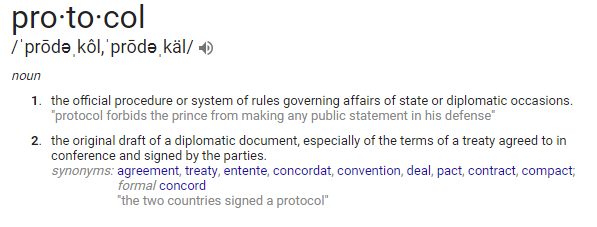Protocol vs. No Protocol
Published: By ClAdmin Category: Lifestyle Topics Tags: advice commentary D/s lifestyle protocolPreface:
- This post is the first in a series of six posts regarding protocol. Put together, they are really, really long. If you have the reading attention span of a gnat on methamphetamines, then the TL;DR version is this: Protocol exists in nearly every BDSM/Kink partnership, whether occasional play partners to full-fledged TPE relationships. It’s not a question of whether to protocol but whether to add degrees of protocol. There’s also a discussion on why protocol != High-Protocol. If you intend to read all of them in one sitting once published, get some water to hydrate and a snack or two – you’ll need both. Feel free to leave us some comments!
angi, g, and mynx.
Protocol: What is it?
Most have heard of protocol, and even if you don’t know what it is yet, you’ve probably seen it. Protocol is a set of guidelines by which individuals are held accountable for acceptable behaviour and how it is displayed and accounted for. It is, within the context of the BDSM/kink lifestyle, a set of established parameters which dominants and submissives (and derivatives thereof) use to navigate groups and personal relationships.
Note that protocol is not simply greeting a dominant with a title or a submissive behaving in a supplicant manner. Protocol is a set of established guidelines, and part of this may include titles and deference, but that is not the whole of it.
Examples of protocol are:
- Groups with defined names (ie: Leather Groups, Goreans, Old Guard, Poly Groups).
- Titles such as “Sir” or “Mistress”.
- Submissives engaging in certain ‘poses’. One such example of standing with hands behind the back with one’s head bowed.
- “Earned Statuses” e.g in Leather Lifestyle - Major Domo, Trainer, Head of Household
- Counting during impact play or forced orgasms.
Some reasons for using protocol (not a comprehensive list):
- Individuals wishing to learn service
- Couples using protocol as a means to establish and learn D/s parameters.
- Bringing kink out of the bedroom and into everyday interactions.
- Titles or terms of endearment to denote respect in private and public.
- A cut off from “everyday life” with a switch to D/s time.
- As a tool to define roles between individuals.
- Establishing rules.
Next in the series: Is Protocol Necessary?
